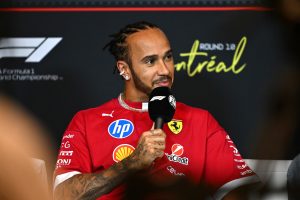Breaking News: Lewis Hamilton’s 7 Shocking Words That Could Change Everything for His F1 Career!
Inside the press room, an atmosphere thick with routine surrounded the journalists, a routine that was only temporarily disrupted by the rapid clicks of cameras capturing the moment. Questions hung in the air like a gentle fog, and there, at the center of it all, was Lewis Hamiltona seven-time Formula 1 world championresponding with the composed precision of a man who has navigated this exact scene countless times before. But then, something extraordinary occurred. In the midst of routine exchanges, seven words slipped into the conversation, spoken almost nonchalantly, yet they sent a shiver through everyone present, freezing the room in a moment of disbelief. Seven words that fans continue to decode, seven words that may very well have altered the trajectory of his legacy forever.

The journalists in front of him did not react immediately, their pens hovering uncertainly above their notepads, parsing whether they had genuinely heard what they thought they had. Even the team’s press officer shifted uncomfortably, casting a searching glance at Hamilton as if hoping he would offer an explanation, retract his statement, or transform that charged moment into a mere misunderstanding. But Hamilton remained silent, allowing his words to hang in the air like an ominous storm cloud that no one knew how to interpret.
Those words could very well be remembered as the instant when the entire world of Formula 1 came to realize that its biggest star was not infallible. Perhaps they were merely the tired reflection of a man under immense pressure. Or maybe they were a warning, a confession, a crack in the armor of the most celebrated driver of his generation.
And now, in the paddock, the same question reverberates relentlessly: Has Lewis Hamilton just hinted at the end of his illustrious career?
The weight of greatness
To grasp why seven words could unleash such seismic repercussions, one must understand the burden Hamilton has carried for nearly two decades. He is not merely a driver; he has become a symbol, a brand, and a movement within the sport. Since his debut in 2007, where he broke barriers and shattered long-standing records, Hamilton has been at the very heart of Formula 1’s global identity. With each victory, his stature grew. Each championship further engraved his name in the annals of history. Every season seemed to bring him closer to being hailed as the greatest driver of all time.
However, with greatness comes an intense pressure. With records come heightened expectations. With fame arrives a spotlight that never dims. Hamilton has endured scrutiny unlike any other driver in the modern era, facing relentless questioning about his lifestyle choices, activism, age, and ability to maintain peak performance in an ever-evolving sport. Yet, throughout these trials, he has remained resilient, continuously reinventing himself, discovering new sources of energy, and propelling Mercedes forward both in times of glory and during challenges.

In recent years, however, the trials have become more grueling than ever before. The bitter disappointment of Abu Dhabi in 2021 lingers in the minds of fans. The rise of Max Verstappen and Red Bull has shifted the competitive landscape, forcing Hamilton into a role he seldom assumes: the hunter rather than the hunted. For a driver defined by his dominance, this complete role reversal burns deeply. With each passing race, the inquiries about his future intensify.
So when Hamilton uttered those seven pivotal words, it felt as though the immense weight he has carried finally surfaced. A man who has persistently sought to present a facade of strength in the face of adversity may have just revealed a glimpse of his breaking point.
The ripple effects in the paddock
The reactions were immediate and intense. Social media erupted with widespread theories and speculation. Fans analyzed the footage frame by frame, seeking meaning in his tone, the glimmer in his eyes, and the brief pauses between his words. Some suggested it was simply a manifestation of frustration following a challenging weekend. Others posited that it was a deliberate hint of retirement, a carefully chosen phrase aimed at preparing the world for what might come next. Then there were those who speculated something even darker: that Hamilton had already made a definitive decision and was merely letting it slip too early.

Within the paddock, the reaction was even more pronounced. Team principals engaged in silent speculation. Drivers were approached for comments, only to decline participation. Sponsors watched nervously, calculating what a future without Hamilton would mean for their investments. The stark reality is that Formula 1 without Lewis Hamilton would not merely be a sport missing one of its greatest talents; it would be a sport devoid of its most visible global icon. His presence has shaped the current era; his absence would inevitably reshape it once more.
The tension within Mercedes may be the most captivating facet of the whole situation. Toto Wolff has built an empire around his partnership with Hamilton, a dynasty that has defined an entire era. Losing him would mean far more than simply losing a driver; it would mean losing the very heartbeat of the team, the foundation of its identity. Yet, Wolff understands better than anyone that no dynasty lasts forever. The private conversations taking place behind closed doors could already be grappling with a reality that no one is truly prepared to face.
And thus, those seven words echo louder with each passing day. What did they truly mean? What will happen next? Is the sport already witnessing the final act of its greatest star?
The question of legacy that no one wants to pose
Even if Lewis Hamilton were to retire tomorrow, his place in the annals of history would remain unassailable. Seven world championships. Over one hundred career victories. Records that will last for decades, perhaps even indefinitely. His impact beyond the racetrackspanning fashion and activismhas transcended motorsport itself. He is more than just a driver; he has become a cultural icon whose influence resonates far beyond the realm of racing.
But legacy is a fragile construct. It is shaped as much by endings as it is by beginnings. The peril of those seven words is that they could morph into the lens through which Hamilton’s career closure is viewed. If he were to leave the sport prematurely, his exit could be perceived as a surrenderan impression that the sport had finally broken him. Conversely, if he remained too long, battling against younger rivals, critics could argue he tarnished the brilliance of his pinnacle years. The balance between glory and regret is as fine as a razor’s edge, and Hamilton now treads that line with every race he competes in.
Fans hesitate to confront the question that looms over every conversation: How will the story of Lewis Hamilton conclude? Will it end with another championship, a final act of triumph that permanently silences any lingering doubts? Or will it close with those seven words in a press room, a silent confession that the greatest of all time has finally had enough?
The answer remains elusive, perhaps even to Hamilton himself. But one thing is certain: the sport feels different now. The world is watching more intently than ever before. And every time he steps into the car, lowers his visor, and speaks into a microphone, the shadow of those seven words looms large over everything.
Because seven words may be all it takes to close the chapter on the most significant era that Formula 1 has ever known.
Leave a Reply